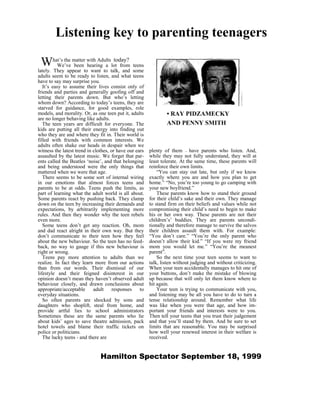
Listening key to parenting teenagers
- 1. Listening key to parenting teenagers hat‟s the matter with Adults today? We‟ve been hearing a lot from teens lately. They appear to want to talk, and some adults seem to be ready to listen, and what teens have to say may surprise you. It‟s easy to assume their lives consist only of friends and parties and generally goofing off and letting their parents down. But who‟s letting whom down? According to today‟s teens, they are starved for guidance, for good examples, role models, and morality. Or, as one teen put it, adults are no longer behaving like adults. The teen years are difficult for everyone. The kids are putting all their energy into finding out who they are and where they fit in. Their world is filled with friends with common interests. We adults often shake our heads in despair when we witness the latest trend in clothes, or have our ears assaulted by the latest music. We forget that par- ents called the Beatles „noise‟, and that belonging and being understood were the only things that mattered when we were that age. There seems to be some sort of internal wiring in our emotions that almost forces teens and parents to be at odds. Teens push the limits, as part of learning what the adult world is all about. Some parents react by pushing back. They clamp down on the teen by increasing their demands and expectations, by arbitrarily implementing more rules. And then they wonder why the teen rebels even more. Some teens don‟t get any reaction. Oh, mom and dad react alright in their own way. But they don‟t communicate to their teen how they feel about the new behaviour. So the teen has no feed- back, no way to gauge if this new behaviour is right or wrong. Teens pay more attention to adults than we realize. In fact they learn more from our actions than from our words. Their dismissal of our lifestyle and their feigned disinterest in our opinion doesn‟t mean they haven‟t observed adult behaviour closely, and drawn conclusions about appropriate/acceptable adult responses to everyday situations. So often parents are shocked by sons and daughters who shoplift, steal from home, and provide artful lies to school administrators Sometimes these are the same parents who lie about kids‟ ages to save theatre admission, pack hotel towels and blame their traffic tickets on police or politicians. The lucky teens - and there are plenty of them — have parents who listen. And, while they may not fully understand, they will at least tolerate. At the same time, these parents will reinforce their own limits. “You can stay out late, but only if we know exactly where you are and how you plan to get home.” “No, you‟re too young to go camping with your new boyfriend.” These parents know how to stand their ground for their child‟s sake and their own. They manage to stand firm on their beliefs and values while not compromising their child‟s need to begin to make his or her own way. These parents are not their children‟s‟ buddies. They are parents uncondi- tionally and therefore manage to survive the salvos their children assault them with. For example: “You don‟t care.” “You‟re the only parent who doesn‟t allow their kid.” “If you were my friend mom you would let me.” “You‟re the meanest parent”. So the next time your teen seems to want to talk, listen without judging and without criticizing. When your teen accidentally manages to hit one of your buttons, don‟t make the mistake of blowing up because that will only let them know where to hit again. Your teen is trying to communicate with you, and listening may be all you have to do to turn a tense relationship around. Remember what life was like when you were that age, and how im- portant your friends and interests were to you. Then tell your teens that you trust their judgement and that you‟ll stand by them. And be sure to set limits that are reasonable. You may be surprised how well your renewed interest in their welfare is received. Hamilton Spectator September 18, 1999 W • RAY PIDZAMECKY AND PENNY SMITH
